Skip to the content
Participant Details
- Community Arts Partner Name
- Lauren Patrice Goldman Marshall
- Partner Type
- Individual
- Profile Photo
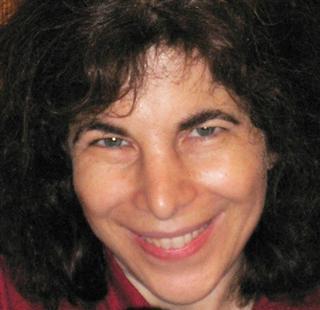
- Individual Bio or
Organizational Statement
- Lauren Goldman Marshall is a playwright, director and teaching artist. She is the founding director of Theater of Possibility (TOP), 2010-present, which serves youth with autism spectrum and other (dis)abilities, as well as kids living in subsidized housing. TOP uses applied theater techniques to build relationship skills, and foster creativity & self-confidence. Lauren served at the artistic helm of Seattle Public Theater for five years, before stepping down to start a family in 2001. Her award-winning plays and musicals have been produced nationally, and published by Samuel French. They range from the hit Seattle revue Waiter, There’s a Slug in my Latté to Abraham’s Land, a drama set in the Middle East. She was one of 6 local artists selected to develop new musicals in the 5th Avenue Theatre’s 2013-15 New Works program. Lauren has worked with diverse groups, including Israeli and Palestinian teenagers, Lummi Nation youth, and kids and teens with disabilities, to develop and produce original plays and video plays. She has directed numerous plays and musicals for professional, community and youth theater, including two Gilbert & Sullivan summer youth productions. Lauren has an MFA in Music Theatre writing from NYU, and BA and JD from Stanford. She has two teenage daughters.
Grade Levels Preferred
- Grade Levels Preferred
- 3rd - 5th, 6th - 8th, 9th - 12th
Artistic Disciplines
- Discipline
- 4, Playwriting & Collaboration; professional development on doing theater with special needs students
- Type
- Developing interpersonal skills and community building through devised theater, including improvisation, introductory acting, collaboration and playwriting.
Also arts integration, using theater to support and deepen academic learning.
Teacher and staff professional development, focusing on using applied theater techniques to foster teamwork, collaboration, and conflict-resolution, with special expertise on creating inclusive, supportive environments for students with special needs.
Experience
- Previous School Partnerships
- Stevens Elementary, Seattle - drama residency with SEL (Social Emotional Learning) class, grades 3-5; biweekly over 9 weeks, Spring 2019. Exploring relationship skills, and fostering creative self-expression, self-confidence and building community through theater.
Arbor Heights Elementary, West Seattle - two - 90 minute workshops, with 4th grade class, using theater and movement activities to explore layers of the rain forest, animals that live in rain forest and human impact on rain forest. Spring, 2017.
Arbor Heights Elementary, West Seattle - two - 90 minute workshops, with 4th grade class, on Washington state history, using drama techniques to reenact the negotiation of the Stevens treaties. Winter, 2017
Laurelhurst Elementary, 2 hour evening workshop for teachers, staff and parents on fostering inclusion for kids with special needs; I co-taught this with my advanced neuro-diverse teen troupe, Spring, 2016
Other, outside K-12 public schools:
Bellevue Youth Theater - Saturday TOP drama programs for neuro-diverse youth, ages 8-14 and 15+, October - June, 2016-2020 (suspended due to COVID).
University Heights Center - weekly after-school TOP drama programs for neuro-diverse youth, ages 8-14 and 15+, September - June, 2011-2020 (suspended due to COVID). Also held several two week, half-day summer camps.
Sandpoint Family Housing - weekly after-school TOP drama programs for kids and tweens in subsidized housing, ages 8-14 (roughly), typically 12-20 sessions per year, 2014-2020 (suspended due to COVID).
Seattle Gilbert & Sullivan Society - two week, full day intensive summer production camps, for ages 10-18, produced HMS Pinafore and Pirates of Penzance, 2017 & 2018.
Sampling of residences and workshops:
UW Special Education - 2 hour workshop for special ed teachers, 2021
World Affairs Council, International Visitor Leadership Program, Role of Independent Theater in Promoting Social Change, 90 minute workshop (with advanced TOP youth troupe) for theater artists from Egypt, 2019.
Washington State Fathers Network - training for fathers of special needs youth, 2018
North American Drama Therapy Association conferences, Seattle (with advanced TOP youth troupe) & Boston, 2016 & 2017.
Sammamish Arts Council - 3 hour drama workshop for kids with specials needs, ages 8+, annually 2014, 2015, 2016
Seattle Pacific University - 2 hour workshop, with advanced TOP youth troupe, for teachers at American Alliance for Theater in Education conference, on how to make arts education more inclusive of students with disabilities, 2014.
Antioch University - workshop for drama therapy students, 2014
California State University -Northridge - 20 hours master class for teachers, therapists and paraeducators, 2013.
5th Avenue Theater - co-taught workshop for high school students studying Oliver!, on process of adaption from a novel to a musical, 2013.
Northwest School - workshop for applied theater class, high school, 2012
and more!
- WA State TAT Lab Graduate
- Yes
- Other Trainings or Certifications
- TAT Alumni lab - Creative Approaches to Classroom Behavior & Arts Integration, 2019 (Plus TAT Lab 2016-17).
North American Drama Therapy Association Conferences, 2016 & 2017 ; member of NADTA
Arts Impact summer session, 2017
Playback Theater, Mandala Center for Change, 2016
Theater of the Oppressed, 6 day training, Mandala Center for Change, 2010
MFA, Music Theater writing, NYU, 1997
- Sample Lesson Description: Student / Classroom Residencies
- Theater of Possibility - 3 hour workshop (ideally two 90 minute sessions, but could be four 50 minute classes). This is an introductory workshop in applied theater, offering beginning acting, improvisation, collaboration and play-creation, with the goals of strengthening relationship skills, improving self-regulation, encouraging creative self-expression and building community and self-esteem. In the first 90 minutes, I introduce some fun, skill-building games and concepts. In the second 90 minutes, we do a structured improvisation, building on collaboration techniques taught in the first half. Depending on the age and goals of the classroom, we may use techniques from Augusto Boal’s Rainbow of Desire and/or Forum Theater to demonstrate techniques for exploring perspectives and solving conflicts.
The Big Idea:
#1) Successful collaboration depends on applying the concept of “Yes, and…” (adding to another person’s ideas).
#2) You have the power to change a bad situation by changing your own actions.
Learning objectives:
- Students will understand and apply the concept of “yes, and...” by responding positively to the ideas of the classmates and contributing ideas of their own that augment the initial concept;
- Students will practice teamwork by assessing “what’s needed” in a given situation and responding accordingly;
- Students will take creative risk by participating in improvisation where they must think on their feet (rather than work from a script);
- When presented with a dramatic conflict, students will take the perspective of both characters, and be able to articulate what each character is feeling (Rainbow of Desire);
- When presented with a dramatic conflict, students will contribute ideas for what the chracter could do differently to try and solve the conflict (Forum Theater).
Theater of Possibility - 20 hour guest artist residency (ideally 12 - 90 minute week or biweekly sessions, plus 2 hour performance block, but it can be done in bi-weekly 50-minute classes, especially for younger students.) This is a full curriculum, designed to take students to performance of short ensemble- created scenes for an audience of peers. In the first half of the program, we focus on theater games that teach foundational acting and improvisational techniques in a fun and playful matter. Games are structured to also highlight relationship skills, such as non-verbal communication, interpreting emotions, perspective taking, leading and following, mistakes and repair, co-creation and teamwork. Students will practice the important concept of “yes, and...,” in which they accept and build on the contributions of their peers.
In the latter half of the curriculum, we use these collaboration skills to create original short scenes in small groups on topics of the students’ choosing. The program culminates in an audience-interactive showcase presentation. (Another classroom or parents may be invited). At the showcase, students will demonstrate a few of their favorite games and present their final scenes. Depending on the proclivity of the students, the scenes may be left unresolved, at which point we invite participants (actors and audience alike) to step into the scene to try out different solutions to the conflict. This technique comes from Augusto Boal’s “forum theater,” which he called a “rehearsal for living.” In this way, the students become the experts, modeling what they have learned about relationship dynamics.
Timeline for a typical 12-week program:
- Introduction & community building: Overview of the philosophy of TOP, and some sample ice-breaker/community building exercises.
- Partner activities (leading & following)
- Physical Theater (acting from the “outside in”; frozen statues & thoughts bubbles)
- Physical Theater #2; Intro to Image Theater (individual and group sculpting of images)
- Emotions, objectives & subtext (acting from the “inside out”)
- Emotions #2; (perspective taking – “The Rainbow of Desire”)
- Collaboration (the concept of “yes and…”) & Character Creation
- Story Creation (e.g. seven sentence stories or hero’s journey templates)
- Share stories; form scene groups; exercises in Group Mind
- Intro to Forum Theater; Shape & Rehearse Scenes
- Shape & Rehearse Scenes
- Rehearse & Perform (ideally a 3-4 hour block with 90 minutes rehearsal; meal break, then performance and closing.
Learning Objectives: same as for 3-hour workshop, but with more depth and sub-objectives.
Arts Integration - 3 hour workshop - WA state history for 4th graders
Title: History, live on stage!
Description: In two 90 minute workshops, we will use theater techniques to bring to life a watershed event in Washington state history: the signing of the first Stevens treaty (by which the Native Americans ceded their land to the US government and agreed to relocate to reservations, in return for monetary payments and the retention of their fishing and hunting rights). Students will create tableaus and characters with differing backgrounds and perspectives, including representatives of Native American tribes both friendly and hostile to the settlers, white and non-white settlers, and mixed-race fur trappers. The workshop will culminate with a reenactment of the first treaty council at Medicine Creek, with key historical characters, including Governor Isaac Stevens, Doc Maynard and his wife Catherine (friends to the Native Americans), Chief Sealth (pro-treaty), Chief Leschi (anti-treaty), Arthur & Mary Denny (white settlers), George Washington Bush (black settler) and other key players. After hearing arguments pro and con, those representing the tribes will decide whether or not to accept the treaty proposal.
Big Idea: Theater allows us to bring history to life from multiple perspectives.
Arts Integration - 3 hour workshop - Amazon Rainforest
Title: The Rainforest - a multi-storied complex!
Description: In two 90 minute workshops, we will use theater techniques to bring to life the Amazon Rainforest, focusing on the four distinct layers: Forest Floor, Understory, Canopy and Emergent. On Day 1, students will explore in their bodies how different creatures within the rainforest move, rest, hunt and play, and why each might be adapted to a certain layer. Each student will receive a photo card with fun facts about a rain forest animal, and must determine to which layer their animal belongs. Then, collaborating in small groups, each group will create a living tableau of a rainforest layer. On the day between workshops, students will do further research on their assigned animal. On this day, they might also make a mural of the four layers, placing animals in their appropriate habitat. On Day 2, we will look at the interdependence of rain forest life and human impact on the rain forest. As their animals, students will act out when happens when the trees are cut down. Then we will create an improvised in which animals representing the different layers take turns trying to convince a logger not to cut down a tree that they depend upon for their survival. In our explorations, we will recognize that humans are also an animal of the rainforest, and that their presence has impact on it.
Big Idea: Through theater, we can inhabit the creatures that live in the rainforest and better understand in our bodies, hearts and minds, the dynamics of this complex and interdependent system.
- Sample Workshop Description: Teacher Professional Development
- 3 hour workshop (half day or two 90 minute sessions): This hands-on workshop will introduce theory and practice of TOP. It is intended for teachers, paraeducators, therapists, counselors and other staff interested in learning how drama and play therapy techniques may be applied to working with students with autism spectrum and other ability differences (such as Down syndrome or cerebral palsy), as well as gen ed populations where the goal is to foster relationship skills and build community. Playful and non-didactic, TOP incorporates concepts from Relationship Development Intervention, a play-based autism therapy. TOP is indebted to RDI for the premise that successful relationships require dynamic (rather than static) social skills, namely, the ability to respond to shifting circumstances. Relationship building depends on improvisation, rather than following a social script.
The workshop will cover highlights of TOP, demonstrating how activities are tailored to foster relationship skills, such as non-verbal communication, recognizing social nuances, perspective taking, flexibility, collaboration and leadership. I’ll model ways to scaffold learning and build cohesion in an inclusion setting, where abilities differ widely, and touch on particular challenges, such as working with students who are nonverbal. I’ll discuss applications for both group and one-on-one settings, and offer methods for developing ensemble-created scenes. The first half will focus on introductory games, and the second will demonstrate a method for using Forum Theater to teach strategies for joining into play or conversation.
Learning Objectives:
Participants will understand how TOP takes the premises of developmental therapies and applies them in a group setting through fun theater activities. They will be able to articulate the difference between static skills (e.g. saying please and thank you) and the dynamic skills required for success on the playground and in the classroom.
They will understand how theater activities that foster imagination, flexibility, empathy, emotional awareness, perspective taking, self-regulation, joining in play, collaboration and problem solving directly address the core deficits of autism (and other developmental/behavioral challenges.)
Participants will learn specific and general adaptations of theater activities to autism spectrum and other special needs populations.
They will learn the importance of scaffolding exercises to build confidence and success when working with special needs populations, and will experience specific examples of scaffolding.
They will be made aware of particular challenges one encounters when working with special needs populations, such as inflexibility, literal-mindedness, and sensory sensitivities, and how activities may be modified to address student needs.
Participants will gain ideas for building cohesion in a differentiated classroom, and for meaningfully including students who are nonverbal or have physical or cognitive limitations and/or behavioral challenges.
They will come away understanding the value of a strength-based approach that honors each person’s unique gifts.
Participants will learn a particular application of Augusto Boal’s Theater of the Oppressed (TO) to working with students with autism spectrum and other learning differences.
20-hour master class: This master class, which can be done as a Fri-Sun weekend intensive or spread out over time (e.g. 90 minute sessions over 12 weeks, plus 2 hour performance block), takes educators through a full TOP curriculum. It starts with introductory, skill-building activities, then moves into collaboration and scene creation, and culminates in an interactive performance incorporating tools from Theater of the Oppressed, such as Forum Theater and Rainbow of Desire. It is designed for educators who want to replicate or integrate TOP in their classrooms. It is especially suited to special ed teachers, homeroom teachers, behavioral health and social skills specialists, and drama teachers, whether or not working with special needs populations, who are interested in teaching applied theater and/or creating original material with their students.
Areas of Experience and Expertise
- Approved Professional Development Provider
- Yes
- Approved Classroom Residency Provider
- Yes
Teaching Approach
- Teaching Philosophy + Approach
- I designed and teach a program in devised theater, called Theater of Possibility ("TOP"), blending aspects of introductory improvisation, acting and playwriting with drama therapy and Augusto Boal's Theater of the Oppressed. It is devised, in that we create our own material from the students' stories and ideas. The primary focus of TOP is on collaboration skills. It is premised on the notion that together we can create something more wonderful than any of us can create alone.
TOP is also applied theater, in that the skills we practice have real life applications outside the classroom. Central to TOP is the idea that you have the power to change a bad situation by changing your own actions. TOP offers tools to better understand relationship dynamics and be empowered, but the social skills training is subtly embedded into an approach that is playful and non-didactic.
Having previously trained and worked in Boal's Theater of the Oppressed, I started TOP in 2010, initially focusing on working with youth with autism spectrum and related disabilities. I thought I would be using theater to teach social skills, but my philosophy has evolved as I learn from my students. Rather than teaching them to conform to social norms, I aim to give them a voice to teach the world. Along the way, we shape powerful emotions and ideas into moving, profound and funny short works of theater. The act of coming together to create a collective work is in itself a powerful social skills training.
I teach TOP to diverse populations, including kids and teens with special needs, ranging from Down Syndrome to high functioning Asperger's, previously homeless youth living in subsidized housing, and a variety of typically- developing and integrated classrooms. I like working with diverse populations because I believe theater is the glue that can bring us all together. My activities are designed to let every person shine, whether the class clown or the dreamy introvert. Because we create our own plays, reading or verbal acuity is not a prerequisite, and activities may be tailored to the developmental readiness of the students. My greatest joy comes when students who assumed they had nothing in common with one another come to value their classmates' contributions. TOP is especially suited to inclusion classrooms, kids entering a new learning environment such as middle school or high school, or any classroom where here is a desire to build cohesion among diverse students.
In addition to working directly with youth, I also teach professional development workshops to educators, counselors, staff and parents, who are interested in learning and incorporating these techniques. The focus of these workshops is on applying theater techniques to build cohesion in a differentiated classroom, especially classrooms where some or all of the students have special needs. Related ideas include helping students overcome writer's block and frozen creativity, and integrating students who are used to being marginalized as poor learners or disruptive.
- Curriculum Integration Possibilities
- My program can be tailored to different teaching goals and durations, ranging from a 90 minute introductory session to a 20 hour full curriculum, and anything in between. The program can be tailored to a specific theme, such as anti-bullying, bridging differences, inclusion, or risk-reduction, or be open-ended to explore whatever topics the students most want to express.
A 20 hour program ideally takes place over twelve 90 minute sessions, plus a two hour performance event. If limited to 50 minute class times, I recommend 15-20 sessions to get to performance. Early sessions focus on foundational skills. At about day 7, we turn to play creation, and finally rehearsal, all the while continuing to develop skills. A performance typically involves a demonstration of select theater games, followed by 2 - 3 short mini-plays, created by the ensemble. Depending on the goals of the workshop, these plays may be presented as ends in themselves, or they may be launching points for further exploration. In the latter case, each short play (3-5 minutes) presents an unsolved relationship conflict. Then, using Boal's technique of "forum theater," the actors and audience ("spect-actors") are invited to take turns stepping into the shoes of the protagonist to try out different solutions to the conflict. Or, we might first create a "rainbow" of the different feelings the characters in conflict are experiencing, in order to better understand the nuances of the problem. Through these and other techniques, students get to demonstrate their mastery of improvisation and relationship skills. They becomes the educators, teaching their peers and teachers what they have learned. It also allows us to turn 10-15 minutes worth of rehearsed material into a very powerful 1 1/2 hour interactive theater event.
With a total process of less than 15 hours, it is hard to get to performance of original material, but TOP can still be used to teach collaboration skills and bring curriculum to life. Shorter workshops might culminate in a structured improvisation. A single 1 1/2 - 2 hour workshop will have an arc to it, from warm up activities to a larger structure, and can be tailored to a single idea, such as, for example, "joining in". Two or four short workshops can be linked to give a taste of forum theater, working from a predesigned scenario.
TOP can be integrated into social skills/anti bullying/health programs, and also into language arts, social science or science curriculums. For social science or science, we might, for example, use theater to bring to life relationship dynamics (e.g. social hierarchy in an ancient civilization), or organic processes (e.g. a water drop's journey through the water cycle). For language arts, my program teaches about writing and the writer's process. E.g. how does one come up with ideas? How so you work with others to merge idea without diluting or compromising your artistic vision? We learn about the elements of drama and story arc. Some of my kids may never have thought of themselves as writers before this class. I have had autistic kids who are barely verbal write amazing dramatic scenes! Other kids might draw out their story in pictures and delight to see it come to life on stage. Drama education helps with executive functioning, sequencing, cause and effect, problem solving and many other skills essential to academic success.
- Special Skills and Areas of Expertise
- I have special expertise in working with special education students and inclusion classrooms, in which special education students are integrated with typically developing peers. I also have worked with other populations who typically have little to no theater experience, including previously homeless youth and students from immigrant families, some of whom may be ELL. I also work with gen ed populations. Building on successful experiences with an inclusion model in my after-school disability program, one of my particular goals is to do a long term (20 hour) project in an inclusion classroom, where we can really focus on building understanding among those who are differently and typically abled. By doing it in an ongoing classroom, I hope to build relationships that can last beyond our workshop experience. I would especially love to do this with teens, for the greater depth we can achieve, although I think there is also great value in building awareness and compassion among younger students.
As mentioned above, I also lead professional development with K-12 teachers interested in learning these specific applied theater techniques.
In other contexts, I also teach workshops in playwriting and play adaptation, coaching students in taking a segment of literature and adapting it into a dramatic scene (for example, Oliver Twist for a workshop at the 5th Avenue Theater). This can be done as a single workshop or a longer event.
- Testimonials from Schools
- "You provided an environment in which one of my most shy students came out of his shell and participated!!!!!" Jamilla Norris, 4th grade teacher, Arbor Heights Elementary
"Definitely, this drama class has transformed these kids to see the possibilities of what they can do. It trains them in all kinds of disciplines. A lot of them didn't like to read, but now that they have to memorize their script, it's nail biting, but I'm impressed. This is what happens when you involve kids with art." David Olivera, Child Care Lead, Sand Point Family Housing, davido@solid-ground.org
"TOP brings hope, focus and connection to young people who are on the fringe of every group they ever try to be part of. My son Jackie was part of TOP for 8 years and it proved to a life saving and life changing experience. Not only did he and the other youth benefit, but TOP reached out to special needs educators to share techniques and strategies for addressing their students needs." Susan Moffitt, parent of student. susanmoffitt@comcast.net
"At first, it seemed A__ was out of the classroom more than he was in, but we just kept encouraging and giving respite. Eventually he was able to stay in the class, even when he had a moment of distress. He just moved away from the group and began writing a story. Afterward he showed Lauren the story and she was so effusive in her praise, A__ positively glowed. From then on he was excited to go, able to stay with the group, and function with the rest of the class. I attribute this success to Lauren Marshall's persistent belief that these kids have value and are some of the most creative people around. She is calm, accepting, and able to elicit outstanding performances from kids who are more accustomed to being marginalized." Marilyn James, grandmother to student
"Lauren became a teacher I could trust and be open with. She could really change things around for me because we were in a small group. Lauren scribed for me because I could not handwrite as fast as the rest of the class. She made sure that everybody else stopped and listened to my ideas even though I was not yelling or crying about them and my voice is very soft so my words do not always come out right." B___ Z__, student
"I wasn't sure what to expect and I was blown away at the determination, energy and passion your students put into the work... It was beyond my expectations.... I definitely recommend this to others." Aimee Horn, PTA President, Laurelhurst Elementary and licensed school counselor.
"Very relevant to myself and my colleagues." Staff Evaluation, Laurelhurst Elementary
"Highly highly recommended," Participant Evaluation, WA State Fathers Network Conference.
"The exercises provided a terrific demonstration of improvisation in general and its very useful application to problem-solving, conflict-resolution and reciprocal communication." & "Lauren was great at positively redirecting the kids to the task at hand." Participant Evaluations, workshop for neurodevelopmental team at Seattle Children's Hospital.
Fees
- Fees
- Negotiable, but typically $50/hour for teaching time, prep time (typically up to 50% of teaching time) and planning meetings. May be less for longer projects (e.g. $1,250-$1,500 for 20 hour residency culminating in performance), depending on the amount of planning and customization involved.
Images
- Image
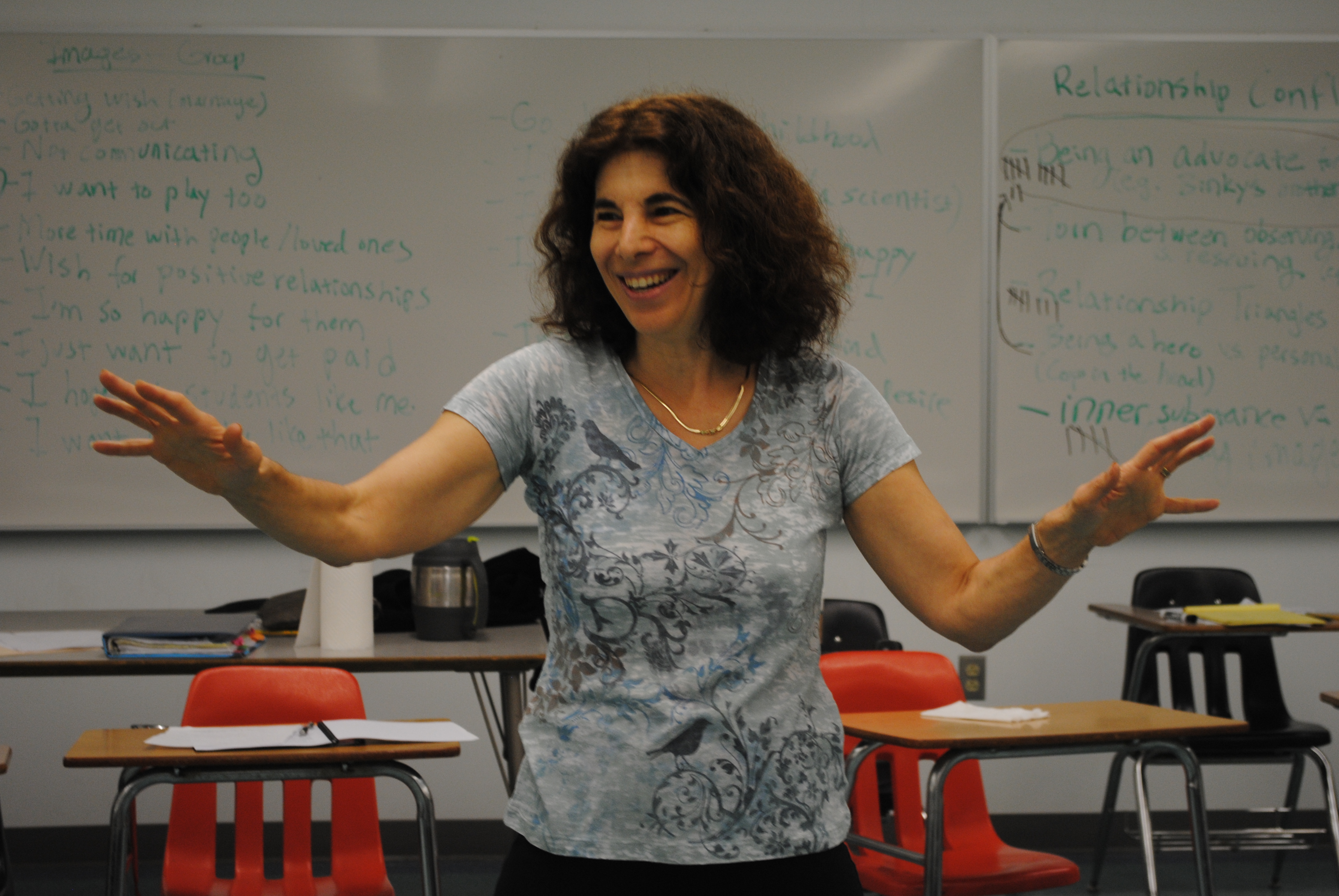
- Image Description
- Lauren teaching a weekend long educator's workshop at California State University Northridge
- Image
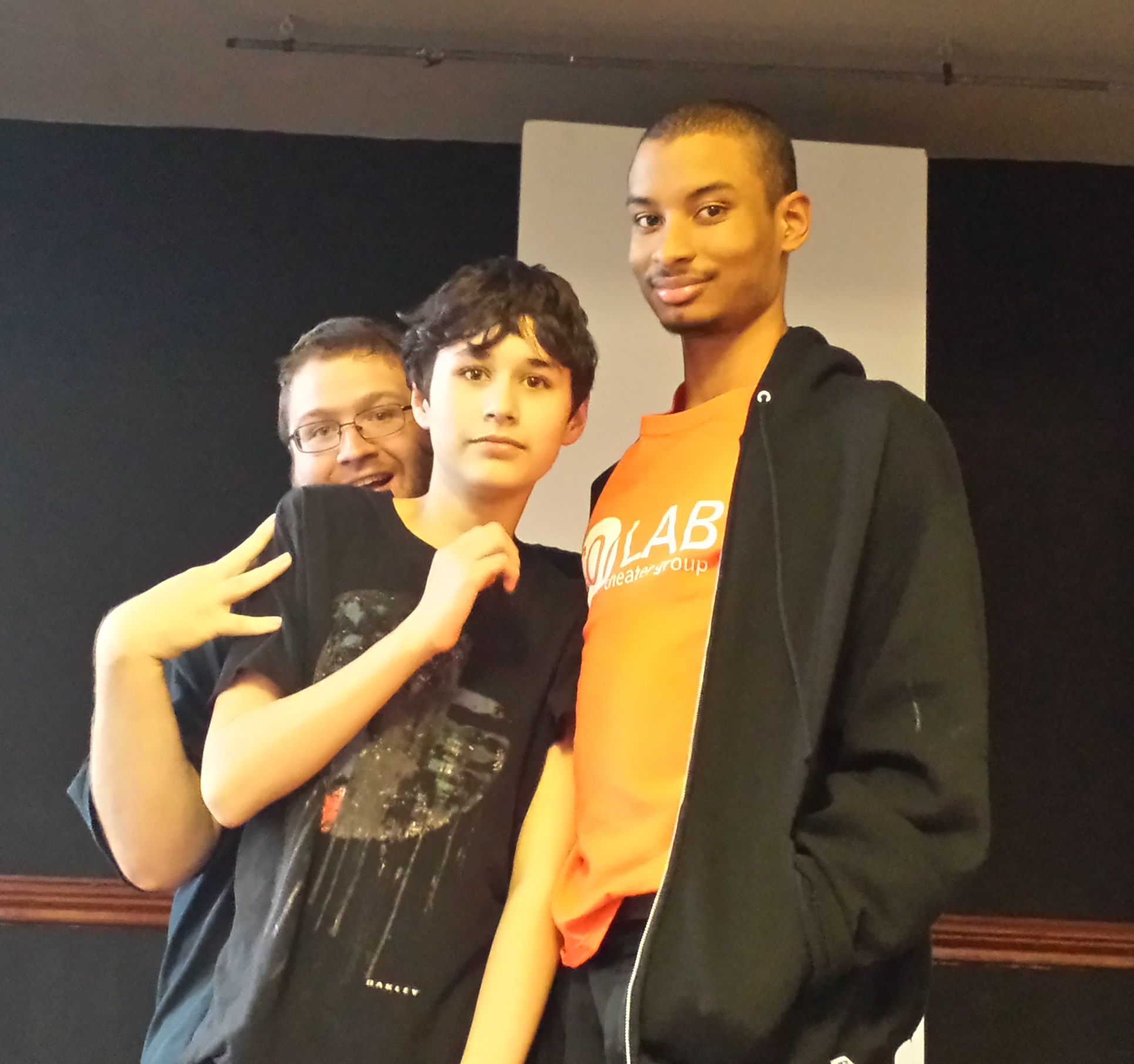
- Image Description
- Performance by students in Theater of Possibility teen class
- Image
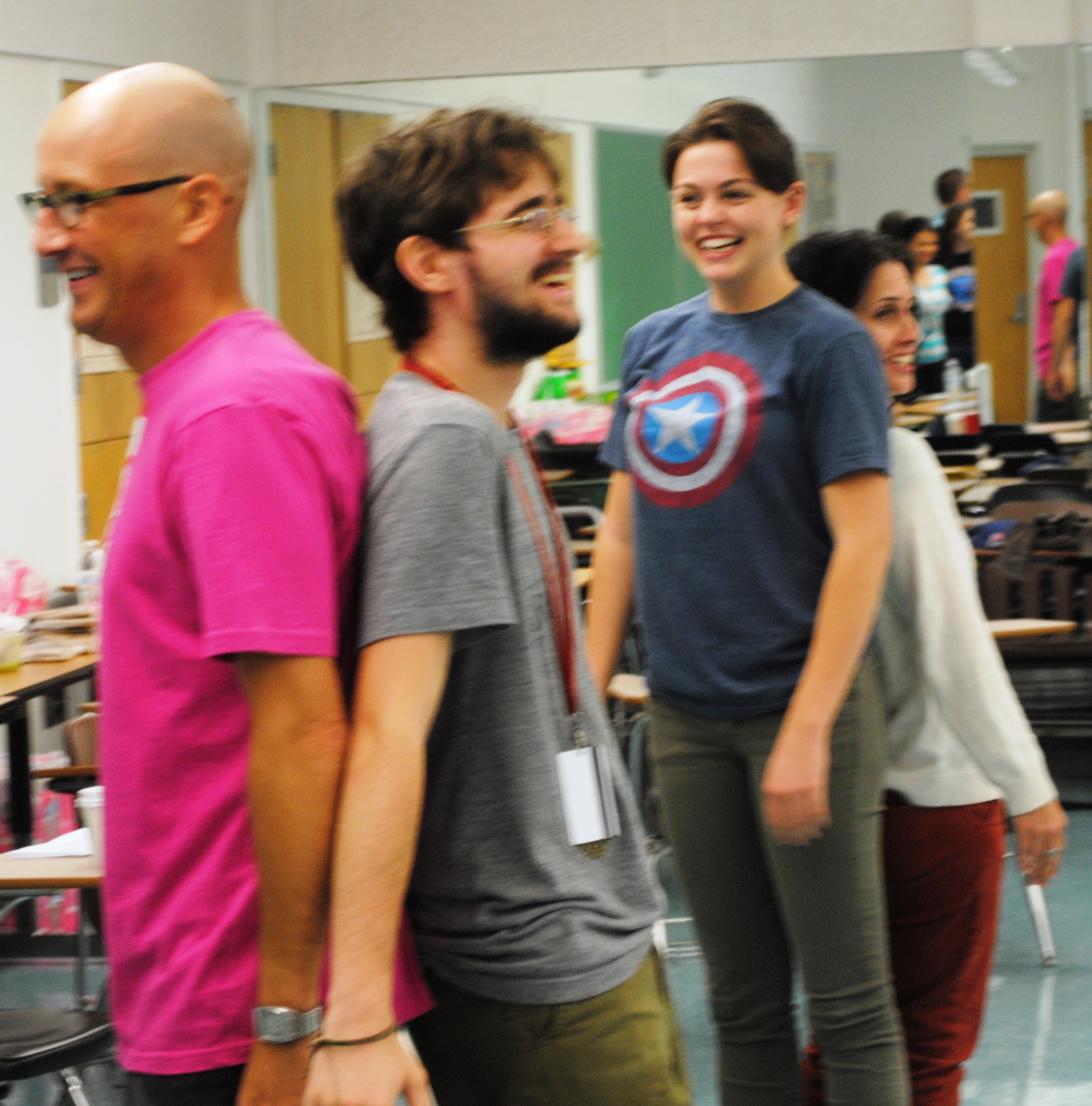
- Image Description
- Warm up activities at educators' workshop on Theater of Possibility for autism, California State University Northridge
- Image
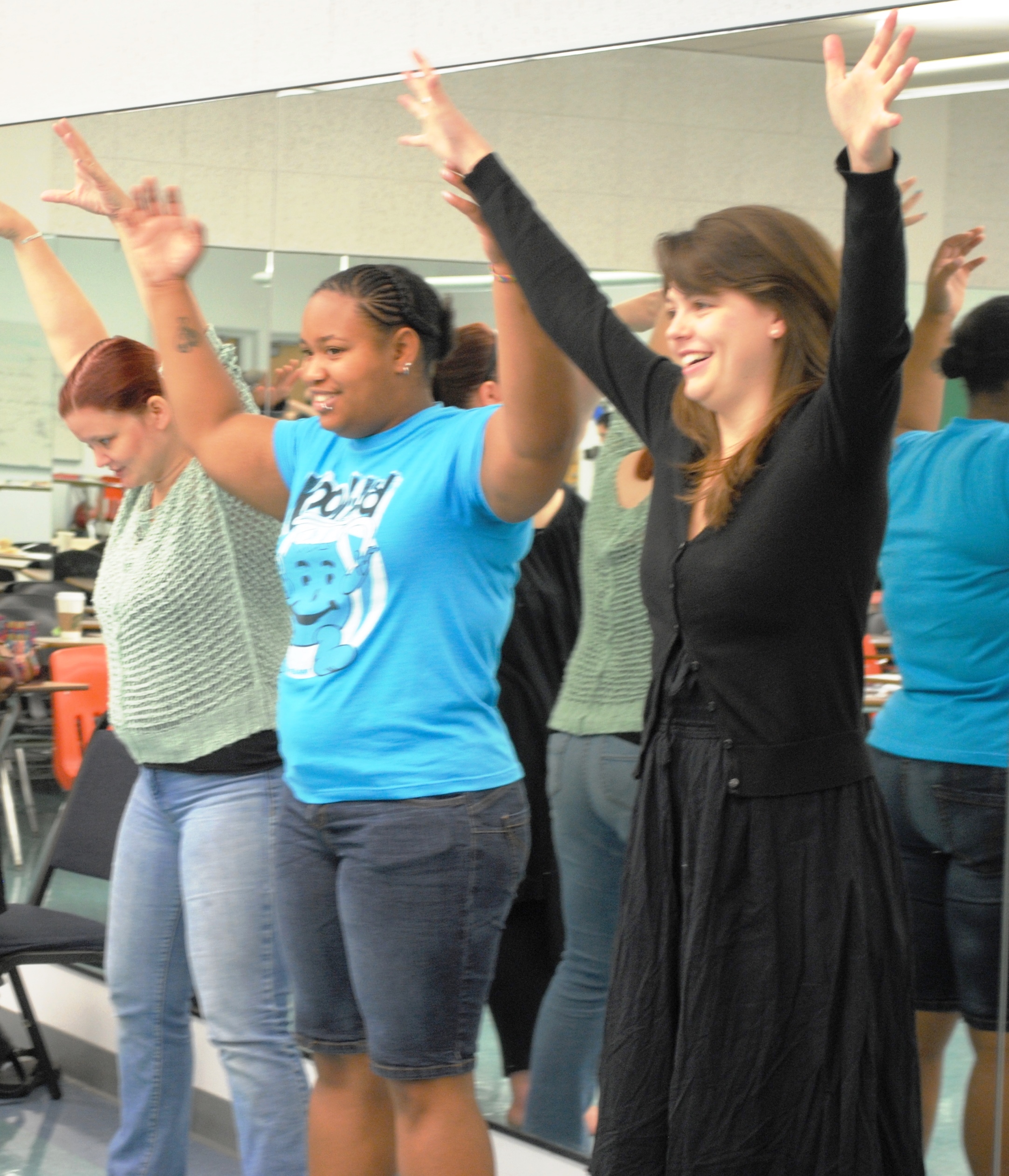
- Image Description
- Warm up activities at adult educators' workshop on Theater of Possibility for autism, California State University Northridge
- Image
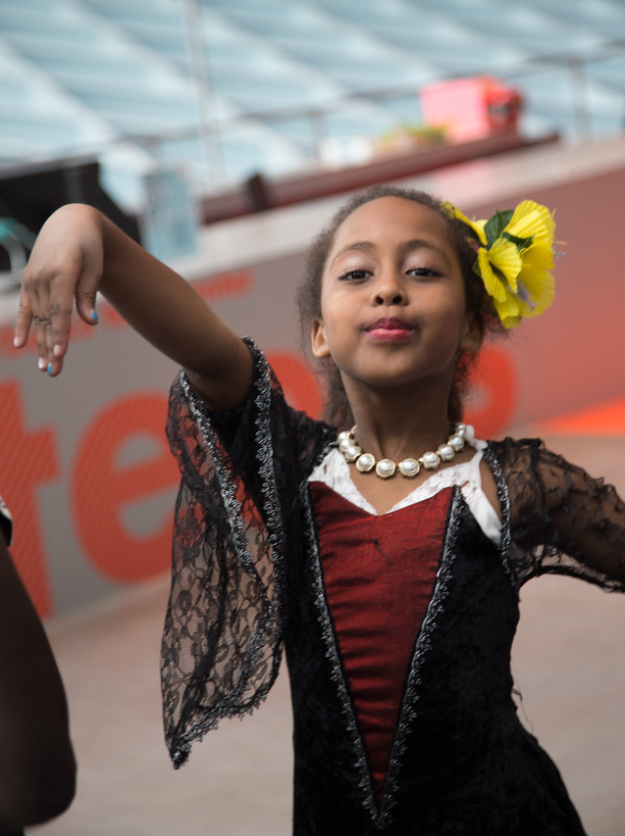
- Image Description
- Theater of Possibility - Sand Point Housing performs The Rude Princess at Seattle Public Library





